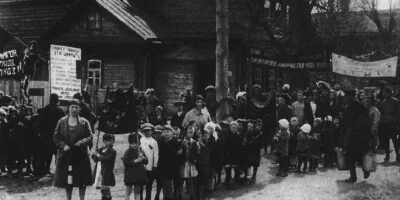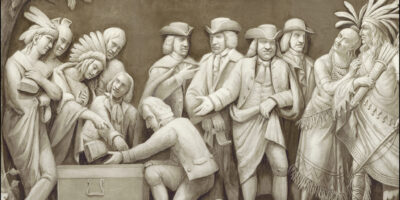Let’s Revive the Term Individualism
If like me you are someone who believes in the values and political principles of individual liberty, personal rights, and limited government, then you face many challenges in the contemporary cultural and political climate. Ideas directly opposed to those principles are gaining ground — on both political sides.
Faced with this situation it may seem frivolous to think about what to call yourself, what label to give your ideas. Surely that is a trivial matter and you should concentrate on the serious stuff such as developing your ideas and getting them out into the public realm?
Indeed you should be doing that, but the question of what name to give the body of beliefs you subscribe to is not trivial: the names of political ideals and movements have a power of their own, independent of the actual content of the philosophy, because of the associations they bring and the emotional response they provoke.
One aspect of this is the way that political labels often begin their life as pejoratives, terms of abuse, before being taken up as a badge of pride by the people they refer to. In that case the power of the label derives from the way it comes to embody a spirit of defiance and solidarity on the part of a group who are being attacked and abused by their opponents. The classic English terms Whig and Tory are examples of this — originally Whig meant a Scottish outlaw and Tory an Irish robber.
This is a case of turning a term of abuse against its originators and making it something descriptive and identity-defining in a positive way. Another case is that of a word being appropriated by people opposed to the ideas it originally referred to, because of its positive connotations. This is of course what has happened with the ideas of individual freedom and limited government.
Originally the word universally used to describe people who supported that position (and related ideas such as rationalism and progress or optimism about the future) was “liberal” with the ideas being labeled “liberalism.” The word had positive connotations partly because of the popularity of the values so labeled but also because of the favorable associations of the word “liberal” in its original sense (meaning open-hearted, generous, broad-minded, and tolerant).
In the United States in the late 19th and early 20th centuries the word “liberal” was taken over as a label by people who advocated a very different kind of politics and ideas. They had originally called themselves “progressives” but by 1900 had adopted the label of “liberal” and in so doing redefined the commonly understood referent or content of that term. It now meant large and active government combined with ethical collectivism of various kinds. Something similar happened in Britain with the appearance at the same time of so-called “New Liberalism,” but the shift in meaning was less clear-cut.
Elsewhere the word “liberal” retained its original meaning for most people. However because of the dominance of the American academy and popular culture in the 20th century it became difficult for advocates of individual liberty in the Anglophone world to continue to describe themselves as “liberals” because that term had come to refer to what everywhere else was called “social democracy.”
Increasingly they came to describe themselves (and be described) as “conservatives.” This was problematic for a number of reasons: in particular, self-identified conservatives had been the main opponents of liberals since the two philosophies had emerged in the 1820s, and there are still significant differences between the two positions and traditions of thought. In particular, liberals and conservatives, who may sometimes agree about economics, are typically sharply divided over issues of personal liberty, privacy, and the role of the state in upholding traditional mores and ways of life. This reflects a more profound disagreement over the moral status of rules and institutions that restrict personal liberty but do not derive from government.
Conservatives typically support them, while liberals oppose them.
However labels and names have real power and effects. If you use one label to describe yourself, then you will often be influenced by the associations the word brings, even if unconsciously, and your own views will tend to shift. (They will also shift because you now associate with and are allied to people fully committed to the original set of meanings associated with the word.) So the appropriated or adopted label will change its commonly understood meaning or referent, but at the same time that referent will be changed by its being associated with the label. (We can see this with the aforementioned progressives, who did indeed move away from their originally robust collectivism in some ways as they came to think of themselves as liberals while at the same time shifting the commonly understood meaning of the term.)
However the story for Anglophone supporters of individual liberty is a more complicated one than that. There was always another label available to them, and for a long time they made enthusiastic use of it. This was the term “individualism” and the associated “individualist.” Individualism was a word that had undergone the change from being a term of opprobrium to one of positive identity. It had originally had connotations of selfishness and egoism but by the 1870s had been adopted by a number of radical liberals as a label for their views, on both sides of the Atlantic (and, interestingly, particularly in France).
In the 1880s and 1890s there was a vigorous intellectual debate on both sides of the Atlantic between the self-defined individualists on one side and the self-defined “collectivists” (in the UK, Canada, and Europe) or “progressives” (in the U.S.) on the other. Subsequently the terms “individualist” and “individualism” remained the main labels used by advocates of the radical case for personal, individual liberty. This was true in the 1920s and even as late as the 1940s and early 1950s (Friedrich Hayek used the term for example and spoke of “those of us who adhere to the individualist position”).
Then quite suddenly, in the middle of the 1950s, all of this changed. People who had described themselves as individualists and identified with that label suddenly stopped using it (with a very few exceptions such as Frank Chodorow). Many adopted the label “conservative,” particularly in the U.S. Most however took to calling themselves classical liberals or libertarians (a word that had previously referred to communist anarchists of the Peter Kropotkin type). The term “individualist,” which had been used until then by both friends and critics, almost vanished.
Why this happened is a mystery. My own suspicion is that it was due to a combination of a generational rupture and the successful meta-political strategy of the CIA at that time, to unite disparate groups into an anti-Communist front — this involved ditching terms and concepts that were clear and therefore divisive.
Today however, people who support the ideals and practice of individual liberty should think very seriously about reverting to the older label and once again calling themselves individualists. The two terms they have used are both problematic, for different reasons. Classical liberal is essentially a historical term, referring to the ideas and personalities of a specific historical period (broadly the 1780s to the 1900s). The danger with using this as a label is that it implies you are advocating a kind of embalmed truth rather than a living intellectual tradition. It also has limited appeal or resonance to people from outside Europe or North America (there were in fact individualist liberals in other parts of the world throughout the 19th and 20th centuries, but they are not remembered in the same way as their counterparts in Europe and the Anglosphere).
Simply using the term “liberal” without qualification is attractive, but there is a definite tradition of collectivist liberalism now and this means a constant need to explain how your own position is different from that, or a qualification of the core individualist perspective.
The widely used term “libertarian” (which I have employed myself) is even more problematic and becoming critically so. Individualism as a label has always had a thick and extensive meaning or set of referents. It refers not just to economic liberalism (free markets and laissez-faire) or political individualism (strictly limited government) but also to lifestyle individualism (J. S. Mill’s experiments in living), cultural individualism and innovation (as in, e.g., Ibsen and Strindberg), and a particular vision of personal identity and the way to live and flourish as a human being. So the label comes with a particular kind of attached content and association, which is philosophical and cultural as well as economic and political.
By contrast the term “libertarianism,” once divorced from its associations with anarchist communism, comes to be understood as meaning only the first two of those things and increasingly only the first, so the economic content comes to dominate and crowd out the social and cultural elements and even the political. Simply saying that you are opposed to large government or support free markets says little or nothing about the kinds of culture, ways of living, character, and social relations that you admire and advocate. So you have a much more thin and ultimately impoverished understanding of what you are about and support.
Even more seriously, using a label that implies that support for free markets and opposition to state welfare is the whole of your position or at least the essential core of it allows very different and actually opposed political philosophies and identities to claim the same label. In particular it allows people who combine the two positions described earlier with collectivist ideals such as nationalism and ethnic identity, or who support the subordination of the individual’s pursuit of happiness to tradition and social (as opposed to governmental) authoritarianism, to claim the label “libertarian.”
In fact there is a deep cleavage between people of that kind and radical individualists. As long as their principal opponents were advocates of a planned and collectivist economy this division could be ignored. However we are now rapidly moving into a world where the division between these two kinds of self-defined libertarians is becoming the main issue in politics.
In that situation the label “libertarian” is the object of a tug-of-war between individualists and small-government conservatives over who has the right to use it. A serious risk is that the term will become associated with what we may call right-wing collectivism and this will discredit and obscure individualists who continue to use it.
Given this, why not revive the term that was used until the 1950s and call yourself an individualist and your philosophy individualism? If you do not want to surrender the term “liberal” to soft collectivism, then speak of individualist liberalism rather than classical liberalism.
There is no danger of this term and its associated identity being appropriated by self-aware collectivists of either the left or right varieties, and in fact it makes it clear that you are at a third point of that triangle, rejecting both kinds of collectivist politics. In other words using the term “individualism” will clarify both what you are for and what you are against, which is always a good thing to get straight.











